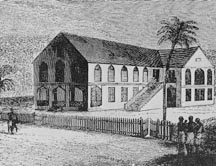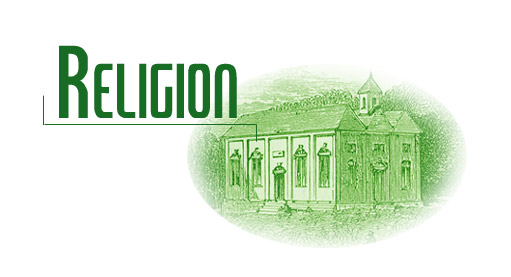
Religion
in the Caribbean was an integral part of both the
white and black societies during periods of emancipation and afterwards.
European missionary groups like the Baptists, Moravians, Quakers, and
the Catholics brought Christianity to the islands.
While many of these groups met with resistance, eventually they
were accepted and their teachings were promulgated throughout the islands. Their interest in converting slaves to Christianity
led to a mixing of Catholicism and African religions. Resulting “creolized”
religions like Santeria and Vodûn contributed
to the culture and identity of countries like Cuba and Haiti respectively, and helped define the
shift from slavery to emancipation.
Meanwhile,
Protestant missionary groups, traveled and
preached throughout the Caribbean, especially the British possessions
with the intention of promulgating their brand of Christianity by converting
slaves. The British island of Jamaica provides a prime example of the results
of white missionary  work.
Missionaries there built churches, schools, and meetinghouses
but were met with a great deal of resistance—more from the whites than
the slaves. The slave owners did not like that the missionaries
wanted to teach their slaves to read and write, they did not want to
give them time off from working in the fields to go to services and
sermons and most of all, they did not want their slaves to have minds
of their own because they feared that would bring about a rebellion.
The slave population did not resist the missionaries as violently as
the whites did. In general, they either accepted the missionaries
or ignored them. work.
Missionaries there built churches, schools, and meetinghouses
but were met with a great deal of resistance—more from the whites than
the slaves. The slave owners did not like that the missionaries
wanted to teach their slaves to read and write, they did not want to
give them time off from working in the fields to go to services and
sermons and most of all, they did not want their slaves to have minds
of their own because they feared that would bring about a rebellion.
The slave population did not resist the missionaries as violently as
the whites did. In general, they either accepted the missionaries
or ignored them.
The
Church and religion as a whole played a major role in the move to abolish
slavery in the West
Indies.
The survival of African religions across the Atlantic passage enabled
many slaves to carry on some semblance of their previous cultures to
the islands, while the introduction of Christianity to the slaves enhanced
their possibilities for emancipation.
|

